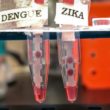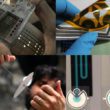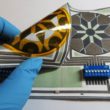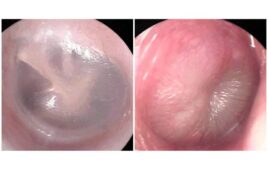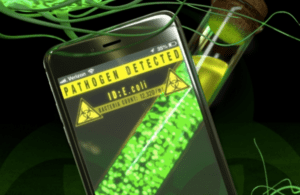
[Image from UCSB]
The detection app uses a smartphone’s camera to measure a chemical reaction and determine a diagnosis within an hour. The test, being simple and low-cost, could be performed in remote locations around the world.
In tests, the system has shown success in achieving rapid diagnosis of urinary tract infections.
“This simple test for urinary tract infections can be conducted in a fraction of the time and cost of clinical diagnostics – one hour versus 18 to 28 hours,” lead author on the study Scott Mahan said in a press release. “We believe that this lab test holds exciting potential to bring state-of-the-art diagnostics within easy reach of non-expert users.
The process of the test is simple. A small sample of patient’s urine is collected and analyzed by the smartphone all using the smartphone’s camera and the included diagnostic kit.
“This is a great example of an interdisciplinary collaboration between biologists and engineers to solve important biomedical problems,” Tom Soh, one of the lead authors on the research, said. “We hope technologies like this offer new ways of providing better healthcare around the globe.”
The test can be done rapidly and can be made for less than $100. It uses a smartphone, a hot plate, LED lights and a cardboard box to make a diagnosis. The researchers suggest that healthcare providers can use the test anywhere in the world to diagnose bacterial infections.
“Urinary tract infections are particularly harmful to pregnant women and can cause miscarriage,” Lynn Fitzgibbons, an infections disease physician and researcher on the study, said. “Thus, there is a medical need for rapid, low-cost, on-site testing – particularly in resource-limited settings.”
UCSB researchers say that the lab test works on a number of pathogens and other patient specimens like blood, urine and feces to diagnose infectious diseases. It can also be modified to detect emerging pathogens that could pose a threat to human health.
“The app enables early-stage diagnosis and intervention, which is particularly important in the context of multidrug-resistant pathogens for which treatment options are highly limited,” Jeffrey Fried, a clinical care physician and researcher on the project, said. “Such early treatment also reduces the risk of emergence of multidrug-resistant pathogens.”
So far the app is compatible with Android operating systems and can be downloaded from the Google Play Store. When opening the app, the user can choose to have a step-by-step tutorial before running a test sample.
The research was funded by grants from the National Institutes of Health’s National Heart, Lung and Blood Institute; the Chan-Zuckerberg BioHub and by the Bill and Melinda Gates Foundation. It was published in the journal EbioMedicine.

